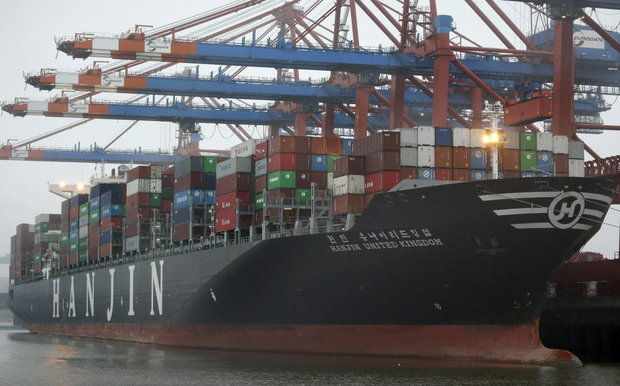forum
library
tutorial
contact

Hanjin's Departure Leaves Region's
Shippers in a State of 'Chaos'
by Conrad Wilson
Oregon Public Broadcasting, March 13, 2015
|
the film forum library tutorial contact |

|
Hanjin's Departure Leaves Region's
by Conrad Wilson
|
 It's a weekday morning and dozens of trucks are already lined up at the Northwest Container yard.
It's a weekday morning and dozens of trucks are already lined up at the Northwest Container yard.
Every day, trucks drop off and pick up containers here. But they're not heading to the Port of Portland, a half-mile away. Instead, they'll be taken by train to Puget Sounds ports.
From there the containers are loaded onto ships bound for Asian markets like Japan.
It's been busy at Northwest Container in North Portland. Many shippers are using the service to get their containers filled with goods to and from the Ports of Seattle and Tacoma.
"Here's not normal. This is very un-normal," said Ron Lobdell, one of the many truck drivers waiting in line to drop off a container and pick up another load. "Since the port closed, it's been backed up like this pretty good."
Just days ago, South Korean based carrier Hanjin officially left the Port of Portland.
The carrier complained it was taking too long to load and unload its ships because of a nearly three-year long, local labor dispute between union members and their employer.
Now businesses around Oregon and southwest Washington are scrambling to find ways to get their goods to markets overseas.
Hanjin accounted for about 80 percent of all the business at Oregon's only international container port.
While the port isn't officially closed, without Hanjin, there are a lot fewer reasons for truck drivers to go there.
David Braman, the general manager of Mitchell Brothers Truck Line, said Hanjin's departure has left many businesses that ship using containers in a state of "chaos."
"We're getting inundated with phone call after phone call from people looking for rates," he said. "Nobody really knowing how they're going to their freight moved from point to point."
While some businesses and farmers may turn to East Coast or Gulf ports, most of the goods that were moving through the Port of Portland are now heading to the ports of Seattle and Tacoma, Braman said.
Right now, businesses here have two options: Move containers by rail or truck.
But those trips to Puget Sound shipping terminals can be four times as costly as a trip to the Port of Portland.
Northwest Container, the rail option, has been so busy recently it's had to close early most days and even turn containers away.
Braman said everything that can't get on the train has to move by truck. And there's a shortage there, too.
"There's not enough equipment to service the area any more," he said. "Something's going to get left behind. And we're all in that same predicament. There's nobody here that's up to this speed yet."
Compounding the problem is a backlog of goods from the months long labor dispute at ports along the West coast, which was only just resolved in February.
For years, Shelly Boshart Davis has relied on Hanjin to ship grass straw from the Port of Portland. She's vice president of International Sales for Bossco Trading in Salem.
"This right here, it's going to Japan," she said, pointing to a forklift as it whizzes by and into a container backed up against the biggest barn you've ever seen.
"We are just one of 13, 14 exporters that bale up the grass straw that's left behind in the field and we bale it, press it, containerize it and ship it to Japan and Korea for cattle feed," she said.
Davis said Hanjin leaving the Port of Portland is frustrating news. Not only will going to Seattle and Tacoma cost more, but she says it's going one driver a full day to make the trip.
"Instead of being able to do two or three turns to Port of Portland from here in Salem, we have to go to Tacoma and Seattle. It's going to cost us that much more in fuel and labor in order to go up to Tacoma/Seattle," she said. "So it is costing us a lot of money."
In a way, Davis is lucky. Her family owns its own trucking line, meaning unlike some companies they can still get the containers to port -- even if it costs more.
With Hanjin now gone, the economic fallout may not be limited to the companies already shipping goods.
Many in the business community worry it will be also harder to attract new companies to this part of the Pacific Northwest.
Related Pages:
Port Extends Ocean Carrier Subsidies by Mateusz Perkowski, Capital Press, 12/10/14
learn more on topics covered in the film
see the video
read the script
learn the songs
discussion forum
